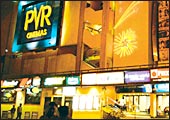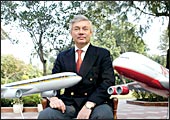 |
| Turmoil in Bengal: vandalised Tata Motors'
showroom |
It's
a wintry December morning in Kolkata, and shops and offices are
readying to open their shutters after a weekend of violent protests
against Tata Motors' proposed land acquisitions in Singur, an
agricultural belt, 60 km off the West Bengal capital. Suddenly
four-five young men walk into Lexux Motors, one of the Tata Motors'
largest showrooms in the central business district of the city,
initially masquerading as customers. One of them moves towards
the front desk and asks if it is a Tata Motors' showroom. Hell
breaks loose soon after, as telephone instruments are flung out
of windows, and iron rods emerge out of nowhere, which come handy
in shattering window panes. Slogans of "Tata go back"
and "Long live the farmers of Singur," fill the air,
even as posters saying as much are slapped across the showroom.
The entire operation takes just 4-5 minutes.
The 1,000-acre land over which Tata Motors
wants to build its factory to produce its Rs 1 lakh car has become
a hot-bed of controversy. The state claims that the process of
acquisition of land, and its fencing, is complete and it will
hand over the land to the Tatas, come hell or high water or Mamata
Banerjee, who is on an indefinite hunger strike. Banerjee's party,
the Trinamul Congress, had called for a 12-hour Bangla bandh and
party activists have been putting up unscheduled road and rail
blockades every now and then across the state. SUCI (Socialist
Unity Centre of India) and other naxalite outfits have also sponsored
a 24-hour Bangla bandh on a separate day and are getting into
violent clashes with armed forces. Social activist Medha Patkar,
writers Arundhati Roy, Mahasweta Devi and a few groups of intelligentsia
have also joined the bandwagon. Support from less predictable
quarters comes courtesy B. Ramalinga Raju, Chairman, Satyam Computers,
who is opposing "any forceful grabbing of farmers' land".
As many as eight chambers of commerce have issued a joint press
statement urging all concerned parties to stop politicising the
issue.
If there is any silent stakeholder in this
whole episode, it is Tata Motors, whose officials are tightlipped.
"We are extremely happy over the way the state is handling
the whole issue and is cooperating with us," is all Ravi
Kant, Tata Motors MD, said in a press conference in Kolkata recently.
And sources say with a land price of Rs 2 lakh per acre, which
has to be paid after five years with an annual interest rate of
0.1 per cent and an electricity cost of less than Rs 3 per KWH
(including demand charges, fuel cost adjustment, electricity duty
and variability of peaks) and proposed tax exemptions, the Tatas
have reasons to be happy. But Singur, unfortunately for Tata Motors,
is one of the Trinamul Congress' few strongholds, with the local
MLA belonging to the party.
In the meanwhile, Uttar Pradesh Chief Minister
Mulayam Singh Yadav and Orissa Chief Minister Navin Patnaik have
reportedly sensed an opportunity and are attempting to woo the
Tatas to their respective states. At Gopalpur in Orissa, the Tatas
had acquired 3,400 acres of land for a steel plant in the mid-90s,
although the project is still in cold storage. Plans for a special
economic zone on this land have also been hanging fire for some
time now. Besides, the state government is developing a hub for
auto component manufacturers over a 500 acre land at Choudwar
in Cuttack district, which is not too far off from the Tatas'
land. West Bengal CM Buddhadeb Bhattacharjee crossed the first
hurdle when he got Ratan Tata to agree to put up the first automobile
unit in the state in independent India. A bigger challenge now
is to hold him back.
-Ritwik Mukherjee
Hot
Flicks and Food
Pack in a meal after catching the latest
hit (or a flop show).
 |
| Growing appetite: It's F&B now |
Ticket
sales would naturally contribute the most to multiplex revenues-63
per cent as per industry estimates-but food and beverages (F&B)
also play their part, with roughly a quarter of sales. The Delhi-based
PVR Cinema is looking to increase the F&B portion by foraying
into food courts, for which 'PVR Food Union' will be formally
launched in June. "PVR Priya and Anupam in Delhi don't need
a food outlet as there are enough options in the area, but Sahara
Mall and Ambience Mall in Gurgaon still need them and this is
where we would do our first opening," says Pramod Arora,
President-Corporate Strategy and Business Development, PVR Cinema.
At Sahara Mall, PVR Food Union will occupy 14,000 square feet
and will have 16 different outlets while the one at Ambience Mall
will be spread over 30,000 square feet with 22 kiosks.
PVR plans to do a pan-India launch of it
new business for which the company has identified Dhanbad, Ahmedabad
and Baroda for the June launch. The company plans to launch the
newer PVR Cinemas and PVR Talkies along with PVR Food Union. PVR
plans to operate 25 such food courts by 2008-end and each would
be covering between 10,000 and 30,000 square feet with total investment
for the entire project ranging between $1-1.5 million (4.5-6.75
crore).
-Pallavi Srivastava
Very
Crowded Skies!
Airbus predicts the need for 1,100 more planes
by 2025.
 |
| Airbus' Leahy: Sees soaring demand for
aircraft |
If
you're hoping that with all the modernisation plans of Indian
airports the air traffic congestion situation will improve, you
probably should not read on. John Leahy, Chief Operating Officer,
Airbus N.A, predicts the Indian market will see demand for over
1,100 aircraft of over 100 seat capacity in the coming 20 years.
Currently there are close to 250 aircraft in India today.
"We are on average delivering one plane
a week to India right now," Leahy says triumphantly. "And
thanks to our customers we have a clear lead over our rivals in
the market. In 2005, out of the 327 orders placed for aircraft,
229 aircraft were from Airbus. This year, Airbus claims to have
a 75 per cent share of orders and right now 53 per cent of the
almost 250 aircraft in service are Airbus aircraft." However,
Airbus has used some innovative math here, since Boeing actually
booked the 68 aircraft Air India order this year (Airbus' calculations
categorise that order in 2005), which would give Boeing a majority
of sales this year.
Despite most carriers being hemmed in by
huge losses-including key Airbus customers such as Kingfisher
and Air Deccan-Leahy still feels the Indian market is viable.
"The airline industry is never an instant money maker, I
believe there will be some growth pains but sooner or later the
market will stabilise and we have complete faith in the viability
of all our customer airlines."
The reason Leahy is so confident is because
he believes that due to the lack of capacity and regulations there
is still a massive gap between actual capacity and future requirements.
"There is a latent 'frustrated demand' in India and that
demand is only getting filled now. Also, there is a tremendous
modal imbalance between rail and air traffic in India which will
drive demand further."
And Leahy is not too concerned about the
infrastructure gap. "There are new, modern airports coming
up in India right now. In fact, your Civil Aviation Minister (Praful
Patel) believes our projections are too conservative, and told
us that he expects over 2,000 aircraft will be acquired by Indian
carriers in the coming 20 years," Leahy chuckles.
Airbus also sees an opportunity to sell A380
and A350xwb aircraft in India (Kingfisher has already ordered
five of each). "I feel Indian carriers will also increase
their share of international traffic to and from India from 35
per cent to at least 50 per cent. In fact, when I look at the
global aviation market I think India and China are going to play
an increasingly important role." In fact, if Airbus is ramping
up its production capacity, it's largely to meet anticipated demand
from India and China. "Our A320 family, which is the aircraft
of choice for many Indian carriers, has seen production boosted
from 32 aircraft a month to 36 aircraft a month and we are thinking
of increasing capacity on the A330/340 line as well to meet demand."
Times are good for the manufacturers, but
you don't see too many passengers who will be jumping for joy
at the news and with the fog season expected to roll into Delhi
now, things are unlikely to improve!
-Kushan Mitra
VCs
Go to School
Manipal Group gets $70m for its education
initiatives.
 |
| MU's Sudarshan: New growth chapter |
With
nearly half of India's 100 crore-plus population under 25, one
sector poised for exponential growth is education. While the education
sector itself holds lot of potential, governmental regulations
have hamstrung and impeded the full participation of private sector
players in a major way, leading to little venture capital funding
coming in. The Manipal group is looking to change things. A pioneer
in private education-having set up India's first private medical
college, the Kasturba Medical College in Manipal, Karnataka way
back in 1953-the southern group is looking at expanding its already
substantial presence in the sector. Manipal Universal (MU), a
part of the Dr Ramdas Pai-owned Manipal Education and Medical
Group (MEMG), has received $70 million (Rs 312 crore) in venture
funding from Capital International and IDFC Private Equity. Currently
MU has annual revenues of nearly Rs 470 crore. Says Anand Sudarshan,
Group President, MU: "We will use these funds mainly to expand
our operations in distance learning, industry-focussed vocational
training programmes and for expansion overseas."
Pointing out that because of an industry-academia
disconnect, vocational training in India has not taken off in
a major way, Sudarshan says MU will aim to bridge the gap. "If
you take the retail sector alone investments announced by the
likes of Reliance Retail, Bharati, AV Birla Group and Future Group
run into several thousand crores. But today there are not sufficiently
trained people to man, say, the retail counters or look after
back-end logistics. Our aim would be to train people to fill these
gaps not just in retail but in other areas like banking, telecom,
media and infrastructure services."
Manipal Education and Medical Group, begins
with nursery schools, runs medical, engineering, management, law,
pharmacy and even journalism colleges. It is also one of the largest
healthcare service providers with more than 7,000 hospital beds
under operation. The group also has an international footprint
with overseas campuses in Dubai, Nepal, Malaysia and Antigua.
Nearly 5,000 international students get trained at its overseas
campuses. Says Sudarshan: "With two universities, nine campuses,
24 professional colleges and 96,000 students, we are already an
international player. The investment which has come in is a vindication
of our strengths and allows us to scale our model. I do not see
any reason why India should not become an education powerhouse
similar to, say, what we are in it." Other VC firms will
be tracking closely this first investment in India's education
sector.
-Venkatesha Babu
|








